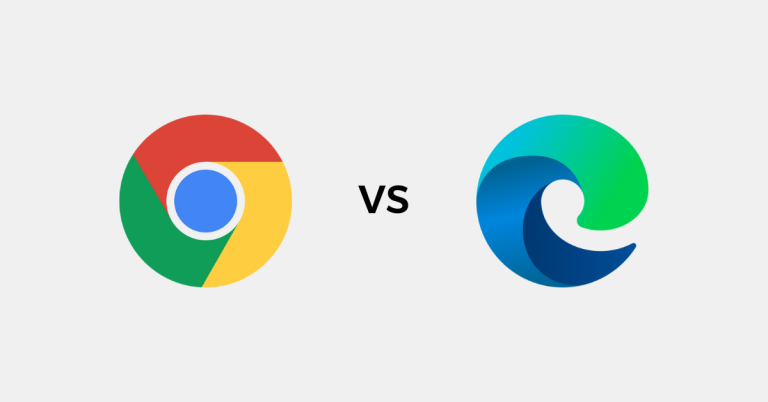Google Chrome VS Microsoft Edge: What's the best browser for you?
By Jeremy A on Thu, Feb 16, 2023 @ 04:02 AM

When it comes to browsing the internet, the choice of web browser can make a big difference in your overall experience.
When it comes to browsing the internet, the choice of web browser can make a big difference in your overall experience. With so many options available, it can be challenging to determine which one is right for you. Two of the most popular browsers on the market are Google Chrome and Microsoft Edge, each with their own unique features and capabilities. In this blog, we'll compare Google Chrome and Microsoft Edge to help you decide which browser is the best fit for your needs. We'll look at key factors such as speed, performance, security, features, and overall user experience to help you make an informed decision. So let's dive in and see how these two browsers stack up against each other.
Google Chrome
Google Chrome is widely regarded as one of the best web browsers available on the market today. Its popularity can be attributed to its fast and efficient browsing experience, as well as its simple and user-friendly interface. With Chrome, you can open multiple tabs, access your favorite websites, and switch between them with ease, all without sacrificing speed or performance. Additionally, Google Chrome is designed with security in mind. Your data and privacy are protected through features such as automatic updates, protection against malicious websites, and the ability to secure your browsing with a password or biometric authentication.
Another reason to choose Google Chrome is its seamless integration with the Google ecosystem. If you already use other Google services such as Gmail, Google Drive, or Google Maps, Chrome makes it easy to access them all in one place. You can also access your bookmarks, history, and other settings across all your devices, simply by logging in to your Google account. Furthermore, Chrome has a vast library of extensions and themes, allowing you to customize your browsing experience and make it more efficient and enjoyable.
Google Chrome is constantly evolving with new features and improvements being added regularly. From the ability to cast your screen to a TV, to the implementation of AI-powered features such as personalized recommendations and real-time translation, Chrome is always finding new ways to enhance your browsing experience. With its combination of speed, security, and versatility, it is no wonder that Google Chrome is the browser of choice for millions of people around the world.
Pros of Google Chrome:
- Fast and Efficient Browsing Experience: Google Chrome is known for its speed and efficiency, making it a popular choice among users who value a smooth browsing experience.
- User-Friendly Interface: The browser's simple and intuitive interface makes it easy to use for both novice and experienced users.
- Wide Range of Extensions and Themes: Google Chrome offers a vast library of extensions and themes, allowing you to customize your browsing experience and make it more efficient and enjoyable.
- Seamless Integration with Google Ecosystem: If you already use other Google services, such as Gmail, Google Drive, or Google Maps, Chrome makes it easy to access them all in one place.
- Strong Security Measures: Google Chrome is designed with security in mind, with features such as automatic updates and protection against malicious websites.
Cons of Google Chrome:
- High Resource Usage: Chrome can consume a lot of your computer's resources, such as RAM and CPU, which can cause slow performance on older or low-end computers.
- Privacy Concerns: As a product from Google, Chrome collects a lot of data from its users, which can raise privacy concerns for some people.
- Limited Customization Options: While there is a wide range of extensions and themes available, some users may feel limited in terms of the customization options they have.
- Automatic Updates Can Cause Interruptions: While automatic updates are a security feature, they can also cause interruptions and slowdowns at times.
- Limited Integration with Non-Google Services: While Chrome integrates seamlessly with Google services, it has limited integration with other non-Google services, which can be a drawback for some users.
Microsoft Edge
Microsoft Edge, formerly known as Internet Explorer, has come a long way since its early days as a web browser. In the past, Internet Explorer was plagued with numerous performance and security issues, causing many users to switch to alternative browsers such as Google Chrome or Mozilla Firefox. However, with the launch of Microsoft Edge, Microsoft has completely overhauled its browser, delivering a modern, fast, and secure browsing experience.
Edge is built on the Chromium open-source platform, the same technology that powers Google Chrome, which gives it a fast and efficient browsing experience. The browser also integrates with Microsoft's ecosystem, making it easy to access your favorite Microsoft services, such as Office, OneDrive, and Bing, without having to leave the browser. Additionally, Microsoft has made security a top priority with Edge, with features such as SmartScreen, which helps protect you from phishing attacks and malicious websites.
Since its launch, Microsoft Edge has received positive reviews and has become a popular choice among users looking for a browser that provides a fast and secure browsing experience. Microsoft is committed to improving the browser, with regular updates and new features being added, such as improved tab management, an immersive reading experience, and an optimized start page. With its combination of speed, security, and integration with Microsoft services, Microsoft Edge is now a strong contender in the browser market, and a far cry from its troubled past as Internet Explorer.
Pros of Microsoft Edge:
- Built on Chromium: Microsoft Edge is built on the Chromium open-source platform, the same technology that powers Google Chrome, which gives it a fast and efficient browsing experience.
- Integration with Microsoft Ecosystem: The browser integrates with Microsoft's ecosystem, making it easy to access your favorite Microsoft services, such as Office, OneDrive, and Bing, without having to leave the browser.
- Strong Security Measures: Microsoft has made security a top priority with Edge, with features such as SmartScreen, which helps protect you from phishing attacks and malicious websites.
- Improved Performance: Microsoft Edge has received positive reviews and is considered to perform better than its predecessor, Internet Explorer.
- Regular Updates and New Features: Microsoft is committed to improving the browser, with regular updates and new features being added, such as improved tab management, an immersive reading experience, and an optimized start page.
Cons of Microsoft Edge:
- Limited Extension Library: While Edge offers a growing library of extensions, it may not have as many options as some other browsers, such as Google Chrome.
- Learning Curve for Some Users: For users who are used to other browsers, there may be a learning curve when transitioning to Edge, especially for those who are familiar with Internet Explorer.
- Issues with Compatibility: Some websites may not be fully compatible with Microsoft Edge, which can cause issues with displaying content or accessing certain features.
- User Experience May Vary: The user experience with Microsoft Edge can vary based on the device and operating system being used, which can cause frustration for some users.
- Syncing Across Devices May Be Limited: While Edge offers the ability to sync your data across devices, the experience may not be as seamless or comprehensive as with other browsers.
AI Integrated Into Our Browsers
AI languages offer several compelling benefits that make them an attractive choice for software developers. By incorporating AI capabilities, programming languages can automate many tasks that would otherwise require manual coding, making the development process more efficient, accurate, and faster. This can help organizations reduce costs, accelerate innovation, and create more sophisticated applications that can provide better user experiences.
One of the most significant benefits of AI languages is their ability to improve accuracy. By leveraging natural language processing and machine learning, AI languages can interpret and understand code in a way that traditional programming languages cannot. This can help reduce errors, eliminate bugs, and make the development process more reliable and efficient. With AI languages, developers can focus on building more sophisticated and innovative applications, rather than worrying about the technical details of coding.
Another key benefit of AI languages is their ability to enhance the user experience. By using AI to analyze user behavior and preferences, developers can create more personalized and interactive applications that can adapt to users' needs and preferences in real-time. This can help improve user satisfaction, retention, and engagement, and provide organizations with a competitive edge in today's fast-paced digital marketplace.
Additionally, AI languages can help organizations scale their applications to meet growing user demands. With AI-powered development tools, developers can create systems that can handle large amounts of data, process complex algorithms, and scale to meet the needs of a growing user base. This can help organizations improve their agility, respond to changing market conditions, and stay ahead of the competition.
In the future, integrating AI languages into web browsers could bring several benefits to users and developers alike. Here are some potential advantages:
-
Enhanced User Experience: With AI integrated into browsers, users could enjoy more personalized and interactive web experiences. AI-powered chatbots could help users navigate websites, answer their questions, and even make recommendations based on their browsing history and preferences.
-
Improved Accessibility: AI language integration could help make the web more accessible to users with disabilities. For example, AI-powered voice recognition technology could enable users with visual impairments to interact with websites through voice commands.
-
Faster and More Accurate Search: AI-powered search algorithms could make web searches faster and more accurate by leveraging natural language processing and machine learning to understand user queries and provide more relevant results.
-
Better Security: AI could help enhance browser security by using machine learning to detect and prevent potential threats such as phishing attacks and malware.
-
Streamlined Web Development: Developers could use AI-powered tools to streamline the web development process, reducing the time and resources needed to create and test websites.
Conclusion
As AI technology continues to evolve, the potential benefits of AI languages are only expected to grow. Organizations that stay ahead of the curve by adopting AI languages will be well-positioned to succeed in the years ahead. However, as with any new technology, there are also potential risks and challenges associated with the adoption of AI languages. It's important for organizations to consider these factors carefully and to adopt AI languages in a way that aligns with their strategic goals and values.
How do you think AI languages will transform the future of software development, and what impact do you think this will have on society as a whole?
You May Also Like
These Related Stories

UX: Why User Experience Is Critical

Content Marketing With Lead Magnets [Part 2]

.png?width=302&height=75&name=BVM%20Logo%20-%20transparent%20(1).png)

No Comments Yet
Let us know what you think